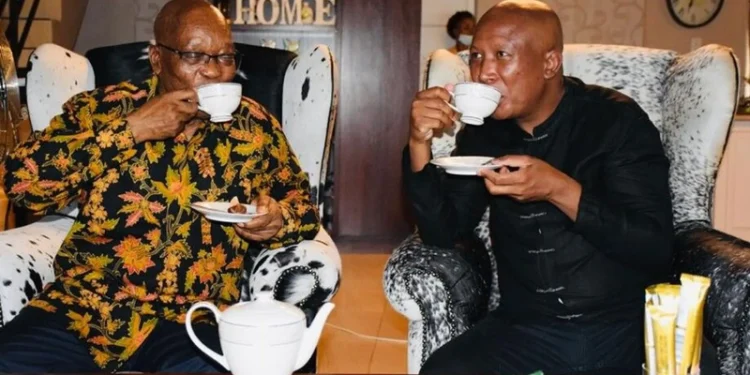In a candid interview with Prof. JJ Tabane on eNCA, Julius Malema, leader of the Economic Freedom Fighters (EFF), delivered a sharp critique of former ANC President and current MK Party leader Jacob Zuma. Malema accused Zuma of a pattern of exploiting political allies for personal gain and abandoning them once they were no longer useful.
The EFF leader highlighted this dynamic within the context of the MK Party, pointing to individuals involved in the party’s foundation who, he claims, were sidelined once their utility to Zuma diminished. Malema’s remarks shed light on the internal political dynamics of the MK Party and broader South African politics, where loyalty and personal agendas often intersect in intricate and controversial ways.
“Zuma uses people for his own purposes, and when they are no longer of value to him, he discards them,” Malema asserted, characterizing Zuma’s leadership style as opportunistic and self-serving. His comments underscore ongoing concerns about political loyalty and the transactional nature of some political alliances in South Africa.
CIC: “once Zuma is done using you, he’ll throw you away”
We have seen this with the people who were there when MK started. How they were dropped and dragged out of positions pic.twitter.com/qolnt1v6dH
— SITHALE✍🏿 (@SithaleKgaogelo) January 14, 2025
Malema’s criticism is not only a direct indictment of Zuma’s leadership approach but also a broader observation about how power and influence often take precedence over collective goals within political structures. The issue of loyalty, both within parties and among individual leaders, remains a contentious topic in the country’s political discourse.
However, Malema’s statements should also be considered within the context of his political positioning. As a vocal critic of Zuma and his allies, Malema has frequently positioned himself as a reformist leader standing in opposition to the established norms of South African politics. By taking aim at Zuma, Malema further solidifies his image as a champion of change and a leader unafraid to challenge the old guard.
The implications of Malema’s comments are far-reaching. If his accusations resonate with the public and within the MK Party, they could deepen skepticism toward Zuma’s leadership and potentially destabilize the party’s unity. Conversely, the critique may also provoke questions about loyalty and stability in South Africa’s broader political landscape, where alliances often shift based on personal or strategic interests rather than shared principles.
As South Africa’s political climate evolves, Malema’s pointed critique serves as a reminder of the complex dynamics that define leadership and alliances in the country’s political arena. Whether his claims will influence public perception or party cohesion remains to be seen, but they have undoubtedly added fuel to an ongoing debate about the nature of political power and accountability.






















